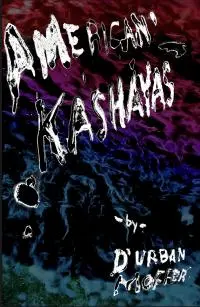Photo courtesy of the author
American Kashayas (Expat Press) is the long-awaited debut by D'urban Moffer, the deadpan Rust Belt Court Jester who's given us a zeitgeist-swallowing tome, an electrified brick of a book that doesn't just have its finger on a pulse — the work itself feels alive beyond its words, beyond my words... I can only really set a scene: a stain-encrusted living room where the Home Shopping Network is on at full-volume, while Cormac McCarthy, Faulkner, and Will Self argue over the television's cloying noise, offering overlapping commentary of our country's contemporary Trash Culture experience. Equal parts insidiously subtle and delightfully overzealous, American Kashayas puts its ear to the asphalt, cataloguing tones untouchable.
You’re an author who has created not just an alter-ego, but a character of himself; yet one whose image you don’t even really make public. The only time I’ve personally seen what you look like was one night at Misery Loves Company, where you were wearing silver face paint, dreadlocks, and assorted colorful accouterments. You resembled a cross between Gary Oldman’s drug dealer character from True Romance, the thing behind the dumpster in Mulholland Drive, Jambi from Pee Wee’s Playhouse, and Max Headroom or something. Do you go to these lengths of disguise to separate the author from the work, to remove the author completely, or to draw attention to the author? Maybe I’m being totally rude and you simply wake up like that, and if that’s the case, I humbly apologize.
I could easily say that it’s a way to separate the author from his work and that would suffice. It is part of it. It's a way for me to maintain a modicum of privacy, however, it doesn’t take much digging to find out who I really am and what I look like. I work at an agency and have certain people in my past that would frown upon my degenerate concoctions, so who needs any of that? When I first went to college, I studied acting and performance art which, to me, was quite instructive in terms of public presentation and the development of confidence. Straightforward and basic is not something I can say I'm ever interested in. It's a mindset which works great in terms of making intriguing art, but unfortunately it's a mindset than unnecessarily complicates a personal life. In many ways, I've had to parlay and compartmentalize anxieties, manias, depression, etc., through an internal community of dramatis personae. It's something I've done so since I was a wee tot. My first pseudonym was the ultradrab moniker 'Dan Wood', and he proved unexpectedly helpful at times. Next to Dan Wood, D’urban has been the most solid and long term of these; he surfaced in the early days of Myspace and Facebook. My mistrust and paranoia in The Surveillance Age began to take shape in the late nineties and has never abated. I ended up giving up and giving in, though. Thank goodness.
 American Kashayas is not your typical 500-page tome. It’s part prose, part poetry, and part visual art experience. Did you feel this unabridged multi-disciplinary approach was the only way to tell such a feral story, or was it more compulsive — an act of throwing everything at the wall to capture its expansive spirit?
American Kashayas is not your typical 500-page tome. It’s part prose, part poetry, and part visual art experience. Did you feel this unabridged multi-disciplinary approach was the only way to tell such a feral story, or was it more compulsive — an act of throwing everything at the wall to capture its expansive spirit?
As I was going through my files, I had a number of options, one of which was a volume of poetry with the working title ‘Holes & Old Souls", however, I didn’t want a strict volume of poetry to be my first official public offering. I also didn’t want one of my more ‘linear’, ‘straightforward’ narratives to be the first, either (if such a beast even exists in my creative world). This brought me to the conclusion that the first outing needed to be an illustrated, thematically linked collection: a comprehensive introduction to my oeuvre and the variety of styles I enjoy exploring. There’s an element of compulsivity to absolutely everything I do (once again, great for art… not so great for a personal life). I think this element is a strong component in everything I complete. My diagnoses do not include obsessive compulsive disorder, however, it seems I exhibit features to passive onlookers. When you're an anomaly the world never forgets to remind you in both subtle and explicit ways.
To me, the book felt like an overflowing swamp where we all get a taste of the muck, rather than strive for the goal to drain it. There’s a surrender here, living to tell the tales by allowing the bubbles to rise to the surface, a blurring of protest and pride — a kaleidoscopic aggregate of the modern American experience. Who do all these diverse, overlapping voices we hear belong to?
The voices in this book originate in the psych wards and bars of Central Ohio, in the prisons, in the incestuous landscape of rural, hollow country and, of course, Hollywood. We can never leave Hollywood out of anything, can we?
You’re involved in the Alt-Write podcast, which to some, might appear a committed series of endurance pieces; to others, a thrilling, immersive dip into audio-Pollock artistic terrorism. Was the name Alt-Write used to bait the infidels, or do you see it more of apolitical playfulness, simply a name, not intended to be provocative? What is your job on the podcast, and what are your aims?
Alt Write is bibles’ baby and he’s responsible for its name, which is/was deployed as comical content fodder and the subject of much discussion amongst us and certain members of the indie lit community. As always, bibles’ goals are multifold; there’s usually an element of agitation to his presentation. He’s a provocateur which is something him and I have in common, but we aren't setting out to be edgelords or whathaveyou, it seems to be coded into our DNA. Alt Write is the second name for the show, but I don't remember what bibles called it when he first began. I tried to contact him to refresh my memory but he's disappeared again. Ultimately, you may be on to something labeling the title as 'infidel bait'. Sounds good to me.
Now, my specific job on the cast was/is as audio engineer and co-anchor. Although if there’s to be a season three, bibles told me that I’m fired and that he wants fresh voices. I think he wants Calvin Westra to do the audio. Take it for what it’s worth, as in the same conversation he told me that I have become him and he’s become me (goo goo ga joob). As far as ‘aims’ go, we decided to artfully employ the sound glitches inherent in trying to capture the man in motion that is bibles (an impossibility) to greater effect. It's tough to do a show as you go about your daily tasks, but we all did it. Writers at work and all that jazz. We discussed using the show's hallmark tech shortcomings to our advantages which naturally lent itself to sound collage and other beloved avant garde jiggery pokery. At the core of it, we're experimentalists, and our group dynamic creates/created such a wonderful environment in which to forge art. If you don't want to call it art, that's okay too. Call it a tonal headache, like one esteemed author did. One of my main goals as sound editor is/was to create a unique world, like the show’s taking place in a semi-haunted factory—which, for all intents and purposes, it is. I wanted to make it a journey to the heart of the creative effort, disorienting but cinematic (possibly dangerous), challenging, hallucinogenic and picturesque, in a sense mimicking our individual bodies of work. The extant sound of Alt Write evolved quite naturally from the auditory premise bibles established in season one. We wanted to push the podcast format and expectations beyond what people have come to expect and into largely untapped territory for this medium as far as I can tell. The closest thing I've found to our approach is Radio Panik. My main inspirations for the approach were the radio variety shows of the mid twentieth century, like Orson Welles’ and John Houseman’s Mercury Theater, or early seventies late night FM with a dash of Sonic Youth, Thinking Fellers Union Local 282 or Zappa's 'Lumpy Gravy' thrown in for extra indigestibility. It’s not for everyone. Neither are bibles’ or my books. He wants to fight me when I say his work is niche. I embrace it. Some of the most challenging or difficult works of art ever created are among my GOAT favorites.
Last year I referred to another Ohio author, William R. Soldan, as the Dark Prince of the Rust Belt or something. I feel like you’re The Rust Belt's Court Jester, but more like one of the old Spanish Compranchicos who had ear-to-ear grins carved/scarred into their face. Like, your poetry is one thing, but you almost remove the poetry from your prose and really tell it like it is, the voices unadulterated, which has an overwhelming comic effect when you take it out of their everyday context. However, it’d be misleading to call the book “comedy,” with this undercurrent of dread weaving throughout its entirety. I asked Soldan this same question — what is it about Ohio that captures your imagination, beyond the fact that it’s home. Do you see it as a kind of ground zero for American Trash Culture?
This is a simple yes or no answer, so, yes. To offer a bit more elucidation: Ohio’s a bowl that everything at the edges of the country rolls into if it’s not properly secured. We're a left-out-to-spoil cross-section of the stars and bars. We’re a test market and a strategic military/industrial/pinkgoo complex non-destination location. This state is just fucking weird, as weird as California or Florida, if not weirder.
Some authors use magick as a mere plot device; you, however, are a sincere practitioner of the occult, from what I understand. How does this affect your writing, or, is writing inherently another form of divination?
I guess I’ll say that I’ve used art in a large number magickal operations. Honestly, I sprinkle a little bit in every artifact I create… not to SELL… but to imbue it with that spark that will hopefully touch the person who finds themselves drawn to it, to challenge and/or elevate the audience in what is increasingly, sadly, a mundane and uninspired/unispiring ‘art marketplace’. All art is divination in my opinion. You have to tap into those liminal spaces to pull forth the universal. Honestly, I think art is inherently a form of magickal manifestation regardless of intention or belief.
Get American Kashayas from Expat Press

About the author
Gabriel Hart lives in Morongo Valley in California’s High Desert. His literary-pulp collection Fallout From Our Asphalt Hell is out now from Close to the Bone (U.K.). He's the author of Palm Springs noir novelette A Return To Spring (2020, Mannison Press), the dispo-pocalyptic twin-novel Virgins In Reverse / The Intrusion (2019, Traveling Shoes Press), and his debut poetry collection Unsongs Vol. 1. Other works can be found at ExPat Press, Misery Tourism, Joyless House, Shotgun Honey, Bristol Noir, Crime Poetry Weekly, and Punk Noir. He's a monthly columnist for Lit Reactor and a regular contributor to Los Angeles Review of Books.








